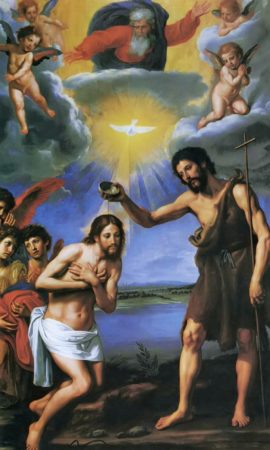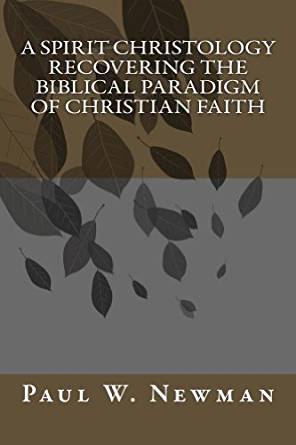Podcast: Play in new window | Download
Subscribe: Spotify | Email | RSS

According to Luke, Jesus made a big public announcement in his local synagogue near the start of his public ministry as Messiah, by way of reading from the Isaiah scroll. Is this a key to understanding his “divine” works and message? This episode is the second part of my conversation with Dr. Paul W. Newman, author of A Spirit Christology: Recovering the Biblical Paradigm of Christian Faith.
He notes that the New Testament presents Jesus as a man empowered and guided by God’s spirit. Just before the aforementioned announcement, and just after his temptation, Luke says,
Then Jesus, filled with the power of the Spirit, returned to Galilee, and a report about him spread through all the surrounding country. He began to teach in their synagogues and was praised by everyone. (Luke 4:14-15, NRSV)
His preaching, evidently, has power. As does his proclamation and demonstrations on God’s Kingdom in the rest of the book.
Among other things, Dr. Newman and I discuss:
- The “social trinitarian” idea of the Trinity as an eternal dance of three equal friends.
- Dr. Newman’s thought about the idea of God as omnipresent Spirit
- the significance of the episode in the synagogue in Luke 4 for christology and for our understanding of gospel
- Jesus’s self-understanding as God’s Messiah
- whether or not Jesus accepted religious worship
- his idea of “testing the spirits” even of the NT authors by Jesus
- interpersonal vs. intrapersonal spirit christologies
- the genuine humanity of Jesus in the fourth gospel
- the terms “unitarianism” and “exclusive monotheism“
 Links for this episode:
Links for this episode:
- A Spirit Christology: Recovering the Biblical Paradigm of Christian Faith
- Dr. Newman’s home page
- St. Joseph’s Oratory in Montreal
- a Catholic apologist on the sorts of honor due to God, to the saints, and to Mary
- Joan of Arc
- Luke 4:14-30; Matthew 3:13-17; John 14:12; Matthew 28:17; Philippians 2:9-11; Revelation 5; 1 John 4:1-3; Isaiah 45:28; John 14:10; 2 Peter 1:4; John 17:5; John 1:1-18; John 8:40; John 14:28; John 17:1-3; John 20:17; John 12:49-50; John 5:32.
- Opera trinitatis ad extra indivisa sunt.
- Lampe, God as Spirit
- “first nations” peoples
- ancient monarchianism
- podcast 58 – We can’t prove the Trinity by reason alone
- podcast 59 – Dr. Carl Mosser on salvation as deification
- podcast 73 – Is Proverbs 8 about Jesus? Part 3
- podcast 72 – Is Proverbs 8 about Jesus? Part 2
- podcast 71 – Is Proverbs 8 about Jesus? Part 1
- Dunn, Christology in the Making
- podcast 70 – The one God and his Son according to John

- podcast 156 – Dr. J.R. Daniel Kirk on A Man Attested by God – Part 2
- podcast 155 – Dr. J.R. Daniel Kirk on A Man Attested by God – Part 1
- “Who Should Christians Worship?”
- podcast 164 – On Counting Gods
- biblicalunitarian.com
- 21st Century Reformation Online
- christianmonotheism.com
- Today’s thinking music is “Even When We Fall” by Philipp Weigl.


I don’t have much to say about this guy. Haven’t read his book and he seems sort of “everywhere” with his views. I appreciate honesty in not pinning down a position when you’re not sure but there’s also a seeming avoidance to pin down a position that emanates from him at times.
I did find it interesting to hear from you Dale that you also have some questions about the “Gospel of John” itself. I also have my own reservations about it because of the consideration of putting myself in that time period reading the other 3 Gospels prior to the “Gospel of John.” If I received that Gospel of John after the synoptics I’d be highly questionable of it in that time period because it’s so different. I don’t think John wrote it for one… there’s inter-testament witness that seems to contradict that possibility. Some have posited it may have been Lazarus or even Mary Magdalene but those are big speculations based on the fact that the writer says so often how much Jesus prefers/loves this writer.. Without getting highly in-depth that Gospel seems to be a big exaggeration of some of the things Jesus said almost like a huge parable. Many things are completely different from the “Jesus” presented in the synoptics. The biggest concern I find is how the synoptics portray Jesus as someone who is hiding his identity as “Christ” until the right moment yet in the Gospel of John it’s like he’s constantly saying it in implicit manners or almost directly from early on.
Would be really curious to hear your views on the subject even if they’re in progress on a future podcast.
Holbrook;
Couldn’t agree with you more on not being able to pin him down on specifics. Yet the next words from you seem to suggest the authorship and some of the words of the book of John are questionable. The same with the guy that was interviewed by Dale. I think first of all early on John was accepted into the Canon and that John was the author. See Clement of Alexandria, Irenaeus, Tertullian, Origin and other’s. I think it is frustrating to carry on a Biblical conversation with someone who when he runs up against some difficulty uses as a scapegoat the authenticity and reliability of those words. It seems to convenient to do so. Now I do believe that some biblical references may lack manuscript support and that must be looked at. i.e. 1 John 5.7 See Metzger “Textual Commentary of the Greek New Testament.” I do believe you were correct in not being able to pin him down. Yet that happens when there is no strong basis for your belief.
Thanks;
Dokimazo
Hello Dokimazo,
Thanks for the comment. I have no problem agreeing with the guy interviewed on some manners just as Dale also said he questions the Gospel of John but didn’t give details. There’s good reason both with internal witness of the other Scriptures that shows problems and also the sheer difference between the synoptics. I still use the Gospel of John and don’t discount it in talks normally nor use it as any excuse to hide my views… but there’s no doubt it presents a very different light on the things Jesus said and at times, did. Mainly, what Jesus said though. I find it odd to have this testimony appear later on and somehow many of the details of the Gospel of John are completely missing from Luke’s account when Luke said he took great pains to gather witness accounts. The sayings are completely alien to the language of the synoptics, almost as if it was written as an after-thought to make the teachings of the Messiah palatable in a different manner of language for a different crowd. Some have argued for the meaning of it being written to combat Gnosticism(but I’ve also read some who think it IS gnostic). One major “did” example… The raising of the dead of Lazarus is completely absent from the other gospels, that is very odd for such a crazy miracle that had much of the towns talking and is supposedly one of the reasons that the religious leaders were upset at Jesus and wanted to kill him and Lazarus according to John’s Gospel(John 12:9-11). Also the one major one I highlighted already was how the Gospel of John presents Jesus as being much more open about his being the “Christ/Messiah” yet when it comes to the synoptics he hides it until the proper time. Then we can get into the calendar issue of the date of Jesus’ death with the Gospel of John compared with the synoptics but I haven’t read up on that in some time.
Overall I had to try to put myself back in that time period and imagine someone handing the Gospel of John then. It’s different, very different. I’d have been suspect if I’d read the other three gospels beforehand to read this drastic difference. I try my best to be as objective as possible(though I know it’s impossible to avoid presuppositions) and recognize that the canon was made by men ultimately and it has been altered since men began making it in the first place. So, just like false letters were going around in that time period and one had to be vigilant to test the letters words… I try to today even though I still have much to learn.
Thanks for the comments again
Interesting interview. Humble guy.
Comments are closed.